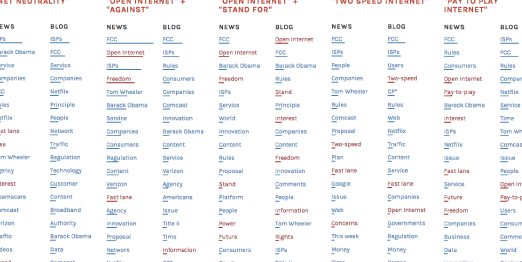Introduction
In this phase of our research we wanted to understand how the Internet talk about Net Neutrality. Debates are always difficult to be named, it’s hard to define a specific focus because of the number of actors and objects involved. The debate on Net Neutrality is, in this context, very particular: indeed this term clearly identifies the proper Internet controversy.
When we approached the theme for the first time, we tried to look at it from different points of view. But we found out that we didn’t need to define this debate through different terms, because it already had one: Net Neutrality.
The queries that we’ve chosen, with the idea that we wanted to obtain data as uniform as possible, are: “Net Neutrality”, “Open Internet” “Stand for”, “Open Internet” “Against”, “Two speed Internet”, “Pay to play Internet”.






